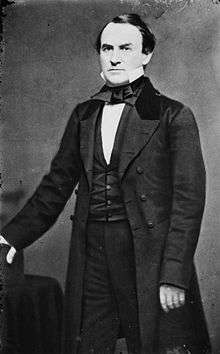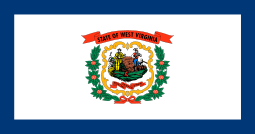Charles J. Faulkner
| Charles James Faulkner | |
|---|---|
 | |
| Member of the U.S. House of Representatives from West Virginia's 2nd district | |
|
In office March 4, 1875 – March 3, 1877 | |
| Preceded by | John Hagans |
| Succeeded by | Benjamin F. Martin |
| United States Minister to France | |
|
In office March 4, 1860 – May 12, 1861 | |
| Appointed by | James Buchanan |
| Preceded by | John Y. Mason |
| Succeeded by | John Bigelow |
| Member of the U.S. House of Representatives from Virginia's 8th district | |
|
In office March 4, 1853 – March 3, 1859 | |
| Preceded by | Alexander Holladay |
| Succeeded by | Alexander Boteler |
| Chairman of the Committee on Military Affairs | |
|
In office March 4, 1857 – March 3, 1859 | |
| Preceded by | John B. Weller |
| Succeeded by | Benjamin Stanton |
| Member of the U.S. House of Representatives from Virginia's 10th district | |
|
In office March 4, 1851 – March 3, 1853 | |
| Preceded by | Richard Parker |
| Succeeded by | Zedekiah Kidwell |
| Member of the Virginia House of Delegates from Berkeley County | |
|
In office 1848 Alongside William Boak | |
|
In office 1832–1833 Alongside William Good and Levi Henshaw | |
|
In office 1829 Alongside Elisha Boyd | |
| Member of the Virginia Senate from Berkeley, Morgan and Hampshire Counties | |
|
In office 1837–1841 | |
| Preceded by | William Donaldson |
| Succeeded by | Thomas Sloan |
| Personal details | |
| Born |
July 6, 1806 Martinsburg, Virginia |
| Died |
November 1, 1884 (aged 78) Martinsburg, West Virginia |
| Political party | Democratic |
| Other political affiliations | Whig |
| Spouse(s) | Mary Wagner Boyde Faulkner |
| Profession | Politician, Lawyer |
| Military service | |
| Allegiance | Confederate States of America |
| Service/branch | Confederate Army |
| Rank | Assistant adjutant general |
| Battles/wars | American Civil War |
Charles James Faulkner (July 6, 1806 – November 1, 1884) was a nineteenth-century politician and lawyer from Virginia and West Virginia. He was the father of Charles James Faulkner.
Biography
Born in Martinsburg, Virginia (now West Virginia), Faulkner graduated from Georgetown University in Washington, D.C. in 1822, studied law and was admitted to the bar in 1829. He was a member of the Virginia House of Delegates from 1829 to 1834 and was a commissioner from Virginia to handle the disputed boundaries between Virginia and Maryland. He was a member of the Virginia State Senate from 1838 to 1842, served in the House of Delegates again in 1848 and 1849 and was a member of the Virginia Constitutional Convention in 1850. In 1848 he introduced in the Virginia House of Delegates a law after which the Fugitive Slave Act of 1850 was modeled.[1]
Faulkner was elected a Whig and Democrat to the United States House of Representatives in 1850, serving from 1851 to 1859. There, he served as chairman of the Committee on Military Affairs from 1857 to 1859. He was appointed by President James Buchanan Minister to France in 1860, serving until he was arrested in August 1861 on charges of negotiating sales of arms for the Confederacy while in Paris, France. He was imprisoned at Fort Warren in Boston. Faulkner was released in December after negotiating his own exchange for Alfred Ely, a New York congressman who was captured at the First Battle of Bull Run. Afterward, he enlisted in the Confederate Army and was assistant adjutant general on the staff of General Thomas J. "Stonewall" Jackson.
Faulkner engaged in railroad enterprises after the war and was a member of the West Virginia Constitutional Convention again in 1872. He was elected back to the House of Representatives as a Democrat from West Virginia in 1874, serving again from 1875 to 1877. Afterward, he resumed practicing law until his death at the family estate called "Boydville" near Martinsburg, West Virginia on November 1, 1884. Faulkner was interred in the family cemetery on the estate.
See also
References
External links
- United States Congress. "Charles J. Faulkner (id: F000044)". Biographical Directory of the United States Congress. Retrieved on 2008-02-13
- "Charles J. Faulkner". Find a Grave. Retrieved 2008-02-13.
 "Faulkner, Charles James". Encyclopedia Americana. 1920.
"Faulkner, Charles James". Encyclopedia Americana. 1920.
| United States House of Representatives | ||
|---|---|---|
| Preceded by Richard Parker |
Member of the U.S. House of Representatives from Virginia's 10th congressional district 1851–1853 |
Succeeded by Zedekiah Kidwell |
| Preceded by Alexander Holladay |
Member of the U.S. House of Representatives from Virginia's 8th congressional district 1853–1859 |
Succeeded by Alexander Boteler |
| Preceded by John Hagans |
Member of the U.S. House of Representatives from West Virginia's 2nd congressional district 1875–1877 |
Succeeded by Benjamin F. Martin |
| Diplomatic posts | ||
| Preceded by John Y. Mason |
U.S. Minister to France 1860–1861 |
Succeeded by William L. Dayton |
![]() This article incorporates public domain material from the Biographical Directory of the United States Congress website http://bioguide.congress.gov.
This article incorporates public domain material from the Biographical Directory of the United States Congress website http://bioguide.congress.gov.

